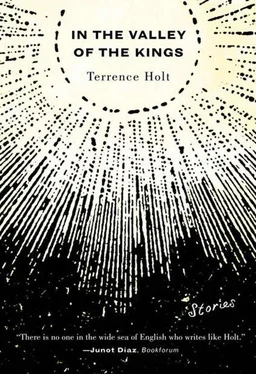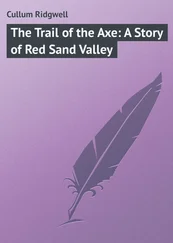The elevator halted: I stepped out, alone in a long hallway. Doors opened on blank corridors; down one hall they all stood open, and in each a small child lay inside a bird-cage, suspended above the floor. At the end I faced a wall of glass, and beyond it cribs and incubators, the dreaming reach of small arms, of feet thrust out falling slowly down.
My anxiety returned. The nurse had discovered the theft; police were seeking me at this moment. I turned, walking quickly, blindly down inconclusive corridors, the envelope clutched at my chest. At a door labeled NECROPSY I shied away, clattered down a flight of stairs (the elevators were a trap), and out into bedlam.
Three ambulances crowding the entrance, hatches open and disgorging three clusters of pale green attendants, flash of chrome and white, an arm asplay, a shocking blot of red. As I watched, my back against the door through which I had emerged, more figures in green converged on each sprawling form until the red was obscured entirely, and each cluster started moving, like a swarm of bees deciding, of a moment, to fly in my direction.
And in the center of the nearest swarm, pale and deathly still, I saw the face of Budge.

The air in the viewing room was immaculately cool, faultlessly clean, perfectly unperfumed. There was a gathering of family seated by the door, receiving the murmurs of the guests. A gloved hand lay limp in mine a moment, some words may have passed. The hand, the words, and I drifted along the edges of the room.
I looked back at the mourners. None seemed substantial, compared with the mountain of gleaming flesh heaped on the dais. Budge shone beneath the sourceless light, so bright he seemed some cinematic trick of projection: I half expected him to dissolve as I approached. But he remained, the husk of him, eyes stiffly shuttered, lips pursed as if disdaining their overlay of rouge. Absolutely still, absolutely absent.
There was a beating somewhere in my skull, a dry pressure about my eyes. The image of Budge’s face vanished into a pool of darkness.

I am — the great one, son of no one, to whom was given his head after it had been cut off. I have knit together my bones; I have made myself whole and sound; I have become young once more; I am—, Lord of Eternity.
I uttered mine own name and I was born, Khepera-Thoth, who rolls his own name before him, lord of divine words, lord of books and master of speech, possessor of all knowledge human and divine.
I will do away the evil by the word of my mouth: Obey me, demon of sickness, demon of blood, abomination of the unclean. I possess my own name, mightier than thine. Yea, the secret of my birth I hold in my mouth. Obey me!
Begone, unclean thing of filth and pus! Begone, for my ba is stablished by the word of my mouth, yea, before my mouth it stablished my mouth.
Unclean thing of blood and filth, thy name is nothing.

I awoke in the dark, the bare room around me awash in whispers.
I could not see.
I heard the curtains sigh, felt them brushing my face where I lay. I could smell; there had been rain in the night. With a rush of fear I thought it might be morning, light lying all around me blind, and I sat up in bed, flung my arms out before me. The curtain passed again across my face, and this time I could see its pale folds. Against the dim angles of the walls, beside the darkness of the open closet, I could make out the faint, flurried pulsation of that deeper darkness, still constricted to a moon-sized disc.
What had awakened me?
There had been a voice, speaking close in my ear a single word that took forever to announce.
I imagined it was the voice of Budge, but I knew it was not: no ghosts trouble my sleep. But there is something other than ghosts. Something older, perhaps, of which ghosts are but an echo. I am certain of this, although I know not what it is. I know only that a voice was speaking, close in my ear, a word whose syllables I might almost recall. But what the word, and whence the voice, still I cannot say.

What profit hath a man of all his labor which he taketh away under the sun?
One generation passeth away, and another cometh: but earth abideth forever.
All the rivers run into the sea; yet the sea is not full; unto the place from whence the rivers come, thither they return again.
All things are full of labor; man cannot utter it: the eye is not satisfied with seeing, or the ear filled with hearing.

The voice of the preacher rustled at graveside, withering in the sun that glared down on the thin, dark figures gathered around. In the heat they wavered as if about to fall. Iris Budge stood nearby; her eldest son, a thinner, taller, pale caricature of Budge, held an umbrella over his mother’s head; he had neglected to shelter himself, and in the premature June heat his red hair clung limp on his forehead; a drop of moisture gleamed at the pinched nose; his eyes were slitted in the intense, inward brooding of adolescence. Not Mrs. B.: throughout the service (saving only the moment when she raised her eyes to stare at me) she gazed, a bit vaguely, on the gleaming shell before her. I blocked her behind a disc of black, the better to compose my face.
The small gathering dispersed, threading outward through the maze of stones and obelisks, leaving behind them the unbearably sleek casket. I stopped, and let the few mourners behind me pass. Back at the grave, the casket had vanished into its socket; the vivid yellow of a backhoe shimmered, its single arm gesturing toward the grave. A half-dozen figures remained, looking from the distance like a group of clay figures. The urge to walk back almost got the better of me, but I stood, held by the shreds of civility that linger, even at the graveside. I knew I could not wait, but I could not imagine how to phrase my request. It would sound selfish. But I was dying: surely they would—
How long I might have wavered there, shimmering in indecision, I do not know: two figures, a short and a tall, detached themselves and walked toward me.

Vaults quiver,
Earth’s bones tremble,
At seeing — rise as power,
Whose mother knows not his name;
Who eats her entrails where he had his name,
Who eats the elder gods when they come, their bodies full of magic,
From the Isle of Flames.

I have another memory of Professor——, dead now these twenty years. He was old when we first met, five years away from retirement, but still hale enough to climb with me on Khufu’s pyramid when he took me with him on his annual expedition to the el Amarna site. My first trip to Egypt was his last; a stroke the month after our return left one side of his body useless, and made his last ten years a cage, in which he struggled to organize the notes of his last dig.
The last time we met the month was May my dissertation was back from the bindery, and in a week I was to be a doctor of philosophy. I had emerged from the library startled to find the sun warm on my head, the air alive with spring, and my feet reluctant at the turning of his gate. To spend an hour or two of a day like this indoors in the company of an invalid seemed suddenly odious.
Читать дальше

















